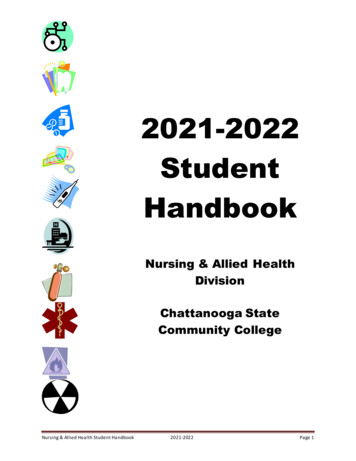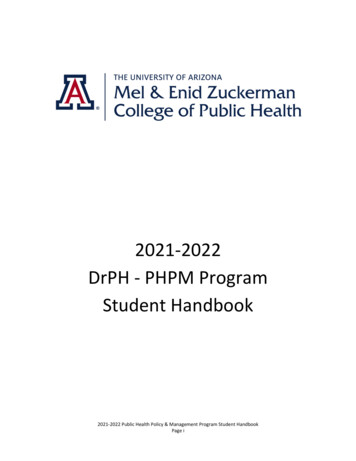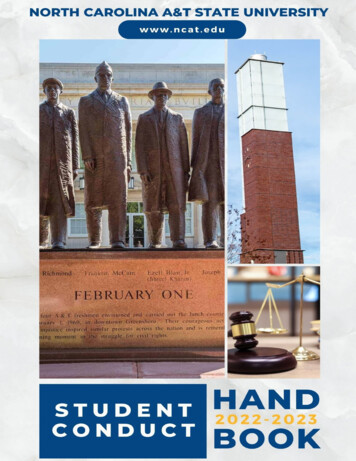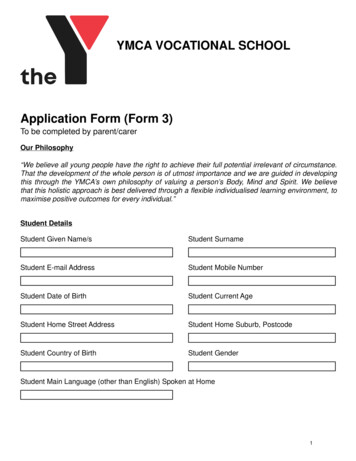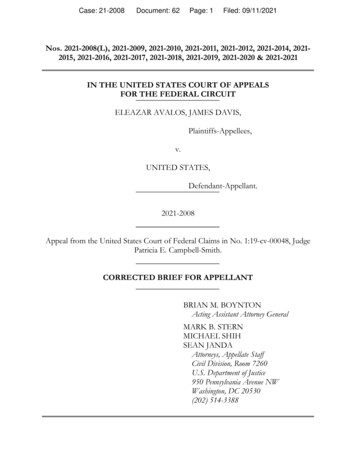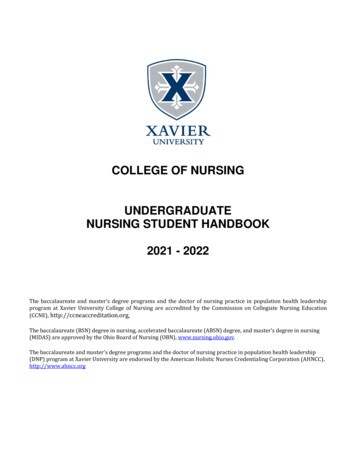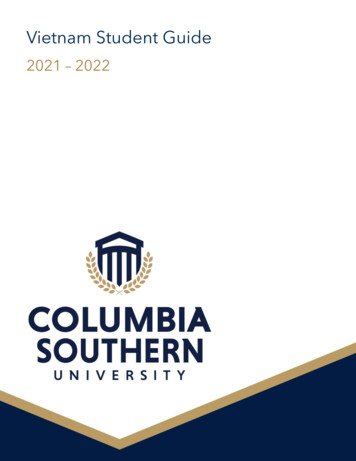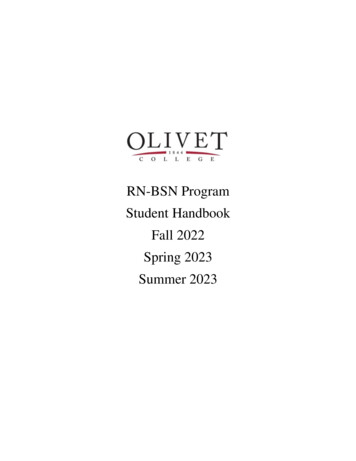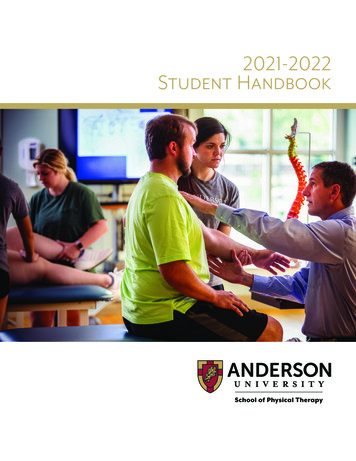
Transcription
2021-2022Student Handbook
ContentsIntroduction . 6Welcome to Anderson University’s School of Physical Therapy! . 6About Anderson University . 7About the School of Physical Therapy (SoPT) . 7About the University Center of Greenville (UCG) . 8About Accreditation . 8Physical Therapy Student Pledge: “The 8As of Anderson” . 9SoPT Faculty and Staff . 10Program Mission and Philosophy . 15Program Goals . 18Essential Functions for Physical Therapists . 20Purpose . 20Essential Functions Defined . 20Students with Disabilities. 21Reasonable Accommodations . 21Procedures . 21Specific Behavioral Competencies Related to Essential Functions . 22Professional Development & Mentoring . 27Advising Process . 27Core Values of the Physical Therapy Profession . 28SPICE of Life Program . 29Changing Advisors . 29Academic Information. 31Educational Philosophy of DPT Program . 31DPT Curriculum Sequence. 32DPT Course Descriptions . 34Course Registration and Fee Payment . 41Canvas Access . 42Financial Aid and Scholarship Support. 42Academic Policies . 43Grading Scale . 43Incomplete Grades . 43Demonstrating Skill Competency . 44Academic Probation . 45Program Dismissal . 45Leave of Absence Requests . 45Academic Honesty . 46Graduation Requirements . 47Other Policies . 482 Page
Access to University Center Facilities . 48House Rules for Use of Student Lounge . 49Borrowing SoPT Equipment or Books . 49Class Attendance/Absences . 50Criminal Background Check & Drug Screen . 50Dress Code and Personal Appearance . 51Duplication of Copyrighted Materials . 52Email/Texting Etiquette . 53Handling Complaints (nonacademic issues) . 54Lab Participation . 55Photographing or Videotaping Class/Lab Activities . 55Social Media. 55Professional Organization Membership. 56Protection of Human Subjects . 56Student Governance within the SoPT . 57Student Records and Information Disclosure . 58Use of Electronic Devices in Class . 58Emergency and Safety Procedures . 59General Security Measures at UCG . 59Classroom intruder / active shooter . 59Medical Emergencies and Personal Injuries . 60Fire / Explosions . 61Bomb threat. 61Threatening Weather Conditions . 61Handling of Hazardous Materials . 61Exposure to Other Health and Safety Risks . 62Clinical Education . 63Philosophy of Clinical Education . 63Structure of the Clinical Education Program . 63Clinical Education Roles. 64Director of Clinical Education. 64SoPT Core Faculty . 64SoPT Clinical Education Faculty . 65Site Coordinator for Clinical Education (SCCE) . 65Clinical Instructor (CI) . 65Student . 67Clinical Site Assignments and Attendance . 67Overview. 67Additional Rules. 68Requesting a Change in Clinical Site Placement . 69Communicating with Assigned Sites . 69Attendance Policy . 69Before a Student’s Arrival at a Clinical Facility . 703 Page
Travel and Lodging . 70Personal Appearance . 71Identification . 71Medical Emergencies . 71Reporting Student Injuries during Clinical Education Experiences . 71Expected Level of Supervision . 71Professional Liability Insurance . 72Evaluation of Student Performance . 72Assessing Progress . 72Grading . 73Health and Safety Regulations . 73Health Insurance . 73Health Records . 73Immunizations . 73Drug/Alcohol Screening and Criminal Background Checks . 74American Heart Association BLS for Healthcare Providers/CPR Certification . 74Americans with Disabilities Act (ADA) Requirements . 74Confidentiality Outside of Patient Care . 75Health Insurance Portability and Accountability Act (HIPAA)/PatientConfidentiality . 75Occupational Safety and Health Administration (OSHA) Requirements . 754 Page
DisclaimerWhenever policies and procedures in this Handbook differ from those outlined in theUniversity’s Student Handbook, this handbook should take precedence.Notice of Non-DiscriminationAnderson University does not illegally discriminate on the basis of race, color, national orethnic origin, sex, disability, age, religion, genetic information, veteran or military status,or any other basis on which the University is prohibited from discrimination under local,state, or federal law, in its employment or in the provision of its services, including but notlimited to its programs and activities, admissions, educational policies, scholarship andloan programs, and athletic and other University-administered programs. In order to fulfillits purpose, the University may legally discriminate on the basis of religion in employment.The University has been granted exemption from certain regulations promulgated underTitle IX of the Education Amendments of 1972 which conflict with the University's religioustenets.The following person has been designated to handle inquiries or complaints regarding thenon-discrimination policy including compliance with Title IX of the Education Amendmentsof 1972 and inquires or complaints regarding the disability non-discrimination policy,including compliance with Section 504 of the Rehabilitation Act of 1973:Dr. L. Diane KingAssociate Vice President for Student Development/Dean of Student Success/Title IXAdministratorThrift Library, Office 203316 Boulevard, Anderson, SC 29621(864) 231-2026ldking@andersonuniversity.eduA report may also be made to the U.S. Department of Education, Office of Civil Rights:U.S. Department of Education, Office of Civil Rights400 Maryland Ave., SWWashington, D.C. 20202-13281-800-421-3481Email Address: ocr@ed.govWeb: http:www.ed.gov/ocr5 Page
IntroductionWelcome to Anderson University’s School of Physical Therapy!We are excited to have you join the Anderson family in our newly developed Doctor ofPhysical Therapy (DPT) program. Physical therapy is a rewarding profession that allowsyou to work one-on-one with individuals of all ages who have experienced some type ofdevelopmental anomaly, illness, or traumatic injury which has limited their ability to moveand interact effectively with their environment. Physical therapists work closely with othermembers of the health care team to help restore functional independence in theseindividuals, as well as promote fitness and prevent movement dysfunction in healthypopulations. Employment projections for physical therapists are expected to remainabove average as the need for physical rehabilitation continues to grow in the future,particularly among aging baby boomers who are staying active later in life.Anderson’s DPT program has several distinctive features. First and foremost, weembrace our Christian heritage and beliefs which form the foundation for all that we do.Our program not only provides students with an opportunity to develop a professionalcareer in health care, but also enables them to grow and mature in their spiritual journey.Our faculty is committed to serving God by serving others. Together we create an openlearning environment that shares and supports Christian values and practices. Thus, weselectively recruit students who share our service commitment and provide them withopportunities to participate in local and global service-learning experiences as part of ourDPT curriculum. Second, we are committed to maintaining a small class size (28 perclass) which allows us to provide our students with more individualized instruction andmentoring. Our dual mentoring process assists students in acquiring and refiningprofessional behaviors and skills through interactions with the faculty and older volunteersfrom the local community who serve as learning partners in our “SPICE of Life” program.Third, our curriculum incorporates opportunities for students to pursue their individualareas of interest through advanced clinical electives, a specialty clinical educationexperience, and completion of a capstone project. In addition, professional developmentactivities and the dissemination of capstone projects ensure that graduates begin theircareer with a distinctive resume.All of these features allow us to function as a family unit and establish meaningful,supportive relationships that we hope will last well beyond the 8 semesters you spendwith us. If there is anything that I, or the rest of the faculty and staff, can do to make youreducational journey proceed more smoothly, please do not hesitate to let us know. Weare praying for your success as you begin your journey with us at AU!Sincerely,Martha (Marty) Hinman, PT, DPT, EdD, MHEdProfessor and Chair, School of Physical Therapy6 Page
About Anderson UniversityAnderson University was one of the first institutions of higher learning for women in theUnited States. In 1848, the Johnson Female Seminary was founded by the ReverendWilliam B. Johnson, a Baptist minister and first president of the South Carolina BaptistConvention. Unfortunately, the school was forced to close during the Civil War and didnot reopen. In 1910, a group of Anderson residents who wanted an institution of higherlearning in their city, offered 32 acres of land and 100,000 to the South Carolina BaptistConvention. The convention nominated a group of trustees, and Anderson College wasgranted a charter in 1911 by the South Carolina General Assembly. The College openedits doors in 1912 and operated as a four-year college for women until 1930. Becauseeconomic conditions at that time limited the affordability of a college education, theinstitution transitioned to a junior college and subsequently became coeducational.In December 1989, the Board of Trust voted to return the College to its former status asa four-year institution beginning in the fall of 1991. This decision was affirmed by aunanimous vote of the General Board of the South Carolina Baptist Convention. In thespring of 2005, Anderson’s Board of Trust again voted to transition the institution from acollege to a university designation to reflect the addition of graduate programs and thereorganization of academic divisions into colleges. Thus, on January 1, 2006, AndersonCollege officially became known as Anderson University.Anderson University is an academic community, affiliated with the SouthCarolina Baptist Convention, providing a challenging education grounded in theliberal arts, enhanced by professional and graduate programs and a cocurricular focus on the development of character, servant leadership, andcultural engagement. This is a diverse community that is Christ-centered,people-focused, student-oriented, quality-driven, and future-directed.About the School of Physical Therapy (SoPT)In response to a growing need and demand for health professionals in the Upstate regionof South Carolina, the senior leadership began to explore the feasibility of adding aCollege of Health Professions (CHP) as part of its 2014 strategic plan. The new collegewould house Schools of Nursing, Health and Human Performance, Allied Health, andPhysical Therapy. Following approval by the Board of Trust in early 2016, the School ofPhysical Therapy (SoPT) was officially launched in 2017 with the hiring of its FoundingChair (Dr. Martha Hinman) and Director of Clinical Education (DCE, Dr. Jessica Jacobs).The newly hired faculty immediately began developing the entry-level Doctor of PhysicalTherapy (DPT) degree program by outlining a curriculum plan, establishing clinicaleducation contracts, purchasing equipment and supplies, renovating laboratory and officespace, recruiting faculty/staff, launching a web site to attract prospective students, andcompleting numerous other tasks required for its initial start-up. The first student cohort7 Page
was admitted in May 2019, shortly after the program was granted its pre-accreditationstatus by the Commission on Accreditation in Physical Therapy Education (CAPTE).About the University Center of Greenville (UCG)Anderson University’s SoPT is housed at the University Center of Greenville (UCG) whichis located at 225 S. Pleasantburg Dr., Greenville, SC 29607. UCG is a consortium ofhigher education institutions dedicated to providing greater access to educationalopportunities for Upstate citizens. Greenville is one of the largest cities in the Southeastwithout its own university. To help the community maintain a competitive edgeeducationally, UCG was chartered to bring undergraduate and graduate degrees fromsome of South Carolina's top universities to the Greenville area.UCG occupies a facility that was formerly known as McAlister Square shopping mall. Assuch, UCG offers a large indoor space that is open to the public, many of whom enjoywalking for exercise on a regular basis. Within the mall, the SoPT has dedicated office,teaching, and research space along with access to a wide selection of classrooms, a largeauditorium, and an electronic library.About AccreditationAnderson University is accredited by the Southern Association of Schools and Colleges(SACS). SACS approved the developing DPT program on February 2, 2018. A site visitby SACS reviewers is expected to occur soon after the first class is enrolled. In addition,all entry-level education programs for physical therapists must be accredited by theCommission on Accreditation in Physical Therapy Education (CAPTE). In March 2017,Anderson University began the pre-accreditation process by submitting a letter of intentto develop an entry-level DPT program.The program’s Application for Candidacy (AFC) was submitted on December 1, 2018 andwas approved by CAPTE on April 30, 2019. The program will undergo further review byCAPTE in the fall of 2021 for initial accreditation; this decision is expected to be renderedprior to the scheduled graduation of the inaugural class in December 2021.Effective April 30, 2019, the Doctor of Physical Therapy program at AndersonUniversity has been granted Candidate for Accreditation status by the Commissionon Accreditation in Physical Therapy Education (3030 Potomac Ave. Suite ail:accreditation@apta.org). If needing to contact the program directly, please call 864622-6084 or email mhinman@andersonuniversity.edu.Candidate for Accreditation is a pre-accreditation status of affiliation with theCommission on Accreditation in Physical Therapy Education that indicates that theprogram is progressing toward accreditation and may matriculate students inprofessional courses. Candidate for Accreditation is not an accreditation status nordoes it assure eventual accreditation.8 Page
Physical Therapy Student Pledge: “The 8As of Anderson”I pledge to:Accept responsibility,Act with integrity, andAspire to excellence, as IAcquire the knowledge and skills needed toAlleviate movement dysfunction,Advance practice through research andservice,Advocate for the health care needs of society,andAdapt to an ever-changing world.9 Page
SoPT Faculty and StaffMartha (Marty) Hinman, PT, DPT, EdD, MHEdProfessor and ChairDr. Hinman began working with the AU administration in aconsultative capacity in 2007 and ultimately joined the AUfaculty 10 years later as Founding Chair for the new School ofPhysical Therapy. She is a 1976 graduate of Medical Collegeof Georgia (now Augusta University) and earned doctoraldegrees at the University of Houston and Nova SoutheasternUniversity. Dr. Hinman has been a full-time PT faculty memberfor over 40 years at 5 different universities. Her involvementwith PT accreditation spans more than three decades and includes numerous site visitsand two terms of service on the Commission for Accreditation in Physical TherapyEducation (CAPTE) which awarded her their Distinguished Service Award in 2015. Dr.Hinman’s clinical areas of expertise include geriatric wellness and balance training, alongwith osteoporosis management and the use of complementary therapies Currently, herscholarship focuses on various educational and accreditation issues. Her resumeincludes over 40 peer-reviewed publications and more than 70 presentations. She is aCertified Exercise Expert for Aging Adults (CEEAA) and master trainer for the “Matter ofBalance” program. Dr. Hinman is married to husband, Pete, and has homes inSimpsonville, SC and Abilene, TX.Jessica Jacobs, PT, DPT, NCSAssistant Professor and Director of Clinical EducationDr. Jacobs was hired in January 2017 to develop the clinicaleducation component of the new DPT program. Dr. Jacobsis a 2009 graduate from the Medical University of SouthCarolina in Charleston and was the first PT to completeMUSC’s post-professional residency program in neurology.Dr. Jacobs is a board-certified specialist in NeurologicalPhysical Therapy (NCS) and an APTA-certified clinicalinstructor. In addition, she holds certifications in specializedrehabilitation techniques for patients with brain injury, stroke,and Parkinson’s disease. Dr. Jacobs is currently earning her PhD in EducationalLeadership at Clemson University. Her research interests include novel therapyapproaches for the treatment of neurological dysfunction and the influence of thinking andpersonality styles on the clinical performance of PT students. Dr. Jacobs also loves tocook and makes her home in Greenville, SC.10 Page
Curt Kindel, PT, PhD, OCSAssociate Professor and Research CoordinatorDr. Curt Kindel joined the SoPT faculty in August 2018after holding an academic appointment for 11 years atSaint Francis University in Pennsylvania. His previousteaching experience included courses in functionalanatomy, biomechanics, therapeutic exercise, andmusculoskeletal patient management. Dr. Kindel is alsoa graduate of Saint Francis University where he earnedhis bachelor’s degree in Health Science (1999) andentry-level Master of Physical Therapy degree (2001).He was certified as an Orthopaedic Clinical Specialist (OCS) in 2007 and re-certified in2017. In 2015, Dr. Kindel earned his PhD in Biomechanics from Penn State University.His research focuses on investigations of joint and muscle mechanics and their influenceon rehabilitation; Dr. Kindel has multiple peer-reviewed publications and presentationsrelated to these topics and serves as the Research Coordinator for the SoPT. He ismarried to Dr. Heather Kindel, who is also a member of the AU’s SoPT faculty. They livein Easley, SC with their two daughters.Matthew de Ruig, PT, DPT, CMTPTAssistant Professor and Admissions CoordinatorDr. de Ruig joined the faculty in May 2019 following 14 yearsof clinical experience in a variety of clinical settings inCalifornia and South Carolina. Prior to coming to AU, heworked as a multi-site center manager for Select PhysicalTherapy in the Greenville area. He has also served as aclinical instructor for PT and PTA students from multipleeducation programs. Dr. de Ruig earned his undergraduatedegree in Kinesiology and Exercise Science from CaliforniaState University in Hayward and his DPT degree from DukeUniversity. He is currently pursuing a second doctorate inHealthcare Education from Nova Southeastern University inFt. Lauderdale, Florida. Dr. de Ruig is a certified myofascial trigger point therapist(CMTPT) and has expertise in dry needling, functional capacity evaluations, and workconditioning. He is currently developing his clinical expertise in the use of diagnosticultrasound and managing the admissions process for the SoPT. Dr. de Ruig loves playingthe piano, disc golf, or whatever sport his two young sons are interested in. His wife,Marla, is also a PT, and they make their home in Traveler’s Rest, SC.11 Page
Heather Kindel, PT, PhDAssistant Professor and Curriculum CoordinatorDr. Heather Kindel joined the SoPT faculty in August of2018 after serving as a faculty member and assistant DCEat Saint Francis University in Pennsylvania. She earned herbachelor’s degree in Health Science in 1999 and hermaster’s degree in Physical Therapy in 2001, both fromSaint Francis. More recently (2018), Dr. Kindel completedher PhD in Instructional Management and Leadership fromRobert Morris University. Her clinical expertise in women’shealth includes a special interest in the treatment of stressurinary incontinence among female athletes. Dr. Kindel isalso a certified True Colors facilitator and enjoys helping people communicate moreeffectively with one another. She has been involved in physical therapy education formore than 15 years and has developed research interests in the use of mindfulness as astrategy for managing student stress. She makes her home in Easley, SC along with herhusband, Dr. Curt Kindel, and their daughters, Jessa and Maura.Cindy Watson, PT, DPT, OCSAssistant Professor and Community OutreachCoordinatorDr. Watson joined the SoPT faculty in August 2018 following23 years of clinical experience in orthopedic physical therapyin a variety of settings including level I trauma centers,hospital-based outpatient centers, and private practice. Sheholds a bachelor’s degree in Exercise Physiology fromSlippery Rock University (1985), a Master of Science inPhysical Therapy from Duke University (1988), and a Doctorof Physical Therapy degree from Drexel University (2006).Dr. Watson is a board certified clinical specialist in orthopedicphysical therapy practice. Her scholarly interests primarily relate to bone health andphysical therapy screening with quantitative ultrasound, questionnaires and balance teststo prevent fractures. Dr. Watson is also coordinating the Senior Partners in ClinicalEducation (SPICE) program and is studying the impact of that program on preparingDoctor of Physical Therapy students for successful clinical practice. She has published inmultiple peer-reviewed journals, taught continuing education for physical therapists,spoken at national professional meetings, and received grant funding for her clinicalresearch. She makes her home in Greenville,
Physical Therapy (SoPT) was officially launched in 2017 with the hiring of its Founding Chair (Dr. Martha Hinman) and Director of Clinical Education (DCE, Dr. Jessica Jacobs). The newly hired faculty immediately began developing the entry-level Doctor of Physical

